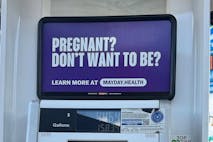
STAGGERING: Abortion killed 10M more humans in 2025 than all other causes
Carole Novielli
·
South Dakota Gov. Noem warns pharmacies they will face penalties for dispensing abortion pill
South Dakota Gov. Kristi Noem is responding to the Food and Drug Administration’s (FDA) latest abortion pill guidance by reminding her state’s pharmacists they face penalties for dispensing the life-ending drug.
In a letter Tuesday, Noem and Attorney General Marty Jackley argue that by allowing pharmacists to dispense Mifeprex, they are effectively trying to skirt “the pro-life evolution of the law.” The two Republicans pointed to the Supreme Court’s Dobbs decision, which triggered South Dakota’s near-total ban on the practice, and the state’s own law prohibiting dispensation of the pill.
“This side-stepping on the part of the FDA permits dangerous, at-home abortions without any medical oversight,” write Noem and Jackley.
“It also violates state law that makes dispensing this medication for abortions a felony. Chemical abortions remain illegal in South Dakota. Under South Dakota law, pharmacies, including chain drug stores, are prohibited from procuring and dispensing abortion-inducing drugs with the intent to induce an abortion, and are subject to felony prosecution under South Dakota law, despite the recent FDA ruling. Their resources should be focused on helping mothers and their babies, both before birth and after.”
The governor’s letter was addressed generally to “South Dakota Pharmacist” and copied the state’s Board of Pharmacy board members.
According to the Associated Press, the director of the South Dakota Pharamicist’s Association has said she is unaware of any pharmacists in the state planning to participate in the federal government’s program allowing abortion pills to be dispensed.
Still, Noem’s letter touches on pro-life concerns about the effectiveness of abortion bans in a post-Roe world. Both sides of the debate have underscored how medication abortions can sidestep the traditional clinic setting and, in doing so, allow women to end their preborn child’s life without the usual medical supervision.
At the end of 2021, the FDA had updated its guidance to remove the in-person dispensing requirement for mifepristone – adding that it would allow certified pharmacies to dispense the product rather than just abortion facilities or other certified prescribers. That raised concerns about the ability of state residents to bypass state laws by obtaining the medication via mail from outside the state.
Guidance released earlier this month made it clear that pharmacies like Walgreens and CVS would be allowed to dispense the drug. In releasing that guidance, the FDA indicated a legal battle was forthcoming over state bans on the law. A Frequently Asked Questions sheet included: “What happens if a state refuses to allow mifepristone to be prescribed for medical termination of pregnancy?”
The agency responded: “We are coordinating with the Department of Justice and others across the government on these legal issues. Any questions regarding preemption of state law should be directed to the Department of Justice.”
Last year’s decision in Dobbs made clear that the Supreme Court was returning abortion regulation to the states rather than allowing decisions like Roe v. Wade to pre-empt their laws on the issue.
The FDA, at least in theory, does not create laws but enforces them through various mechanisms, including guidance related to drug safety. Their recent abortion pill guidance allows pharmacies to participate in what’s known as a Risk Evaluation and Mitigation Strategy (REMS) program, which collects data on adverse events involving particular products.
Although that data has been criticized for its limited scope, the FDA has cited it in describing the pill as safe for use. It has cited other literature as well, but serious concerns remain about the agency’s recent liberalization of access to the medication.
Live Action News is pro-life news and commentary from a pro-life perspective.
Contact editor@liveaction.org for questions, corrections, or if you are seeking permission to reprint any Live Action News content.
Guest Articles: To submit a guest article to Live Action News, email editor@liveaction.org with an attached Word document of 800-1000 words. Please also attach any photos relevant to your submission if applicable. If your submission is accepted for publication, you will be notified within three weeks. Guest articles are not compensated (see our Open License Agreement). Thank you for your interest in Live Action News!

Carole Novielli
·
Abortion Pill
Angeline Tan
·
Abortion Pill
Nancy Flanders
·
Analysis
Cassy Cooke
·
Politics
Bridget Sielicki
·
Human Interest
Andrea Trudden
·
Human Interest
Sam Dorman
·
Activism
Sam Dorman
·
Activism
Sam Dorman
·
International
Sam Dorman
·
Activism
Sam Dorman
·